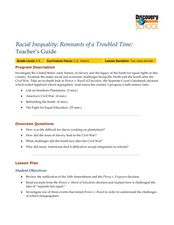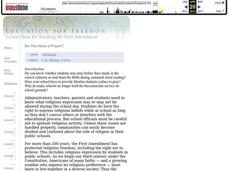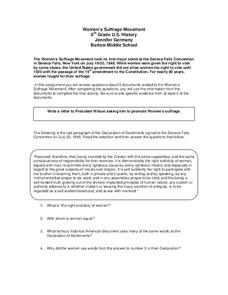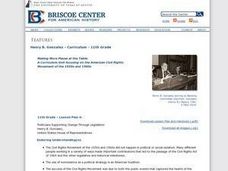US House of Representatives
“The Fifteenth Amendment in Flesh and Blood,” The Symbolic Generation of Black Americans in Congress, 1870–1887
The reading of a contextual essay launches a study of Black Americans who served in Congress from 1870 through 1887. Young historians identify the African Americans who served during this period, investigate the ways they won national...
Curated OER
Women's Votes, Women's Voices
Young scholars investigate Women's Suffrage by analyzing images from the past. For this equal rights lesson, students read biographical work about Emma Smith DeVoe, an activist who fought for women's rights. Young scholars view a comic...
Curated OER
Racial Inequality: Remnants of a Troubled Time
Middle schoolers watch the Discovery program "Racial Inequality: Remnants of a Troubled Time" then examine the ratification of the 14th Amendment and the Plessy v. Ferguson decision. They research one of three events that tested Brown...
Curated OER
Racism: Law and Attitude
Students examine discrimination laws. In this racism lesson, students compare and contrast de facto and de jure discrimination. Students also explore the Bill of Rights and determine what makes some acts and speech illegal.
Curated OER
Twelve Angry Men: Trial by Jury as a Right and as a Political Institution
Students explore the constitutional guarantee of the right to trial by jury. In this U. S. Constitution lesson, students read or view Twelve Angry Men and respond to discussion questions regarding the jury. Students examine the...
Carolina K-12
African Americans in the United States Congress During Reconstruction
The Civil Rights Act of 1866, which granted citizenship to all males in the U.S., resulted in the first African Americans to be elected to Congress. Class members research 11 of these men, the challenges they faced, and craft...
Syracuse University
Women's Suffrage Movement
Women gained the right to vote in the twentieth century, but the fight for equality dates back centuries. Using an invitation to an 1874 suffrage convention, eager historians consider the motivations behind supporters of the suffrage...
Tennessee State Museum
Understanding Women’s Suffrage: Tennessee’s Perfect 36
Tennessee was the pivotal state in ratifying women's suffrage in 1920, with its vote coming down to one man: Harry Burn, a 24-year old state representative who changed his nay to an aye on the advice of his mother. Learn more about...
Curated OER
Individual Rights - The Right To Equal Protection
Students examine the concepts of equal protection, discrimination, affirmative action, and racial profiling. They analyze the Equal Protection Clause, participate in a mock trial, and discuss the different parts of the trial.
Curated OER
Do You Have a Prayer?
Students review the 1st Amendment and the clauses which deal with prayer/religion in schools. They discuss, in groups, the Equal Access Act, which gives students the right to practice/express their religion at school and take a quiz on...
Curated OER
Justice Demands an End to Segregation, But it Does Not End
Learners define human rights and describe how it applies to politics, economics and cultural rights. As a class, they watch a video how the Constitution was made and discuss its purpose. In groups, they present information to the class...
Curated OER
We the People
Students examine both the Preamble of the Constitution and the Bill of Rights. They work in small groups to connect the two documents and analyze how the documents are important to their lives today. They create a poster that visually...
K12 Reader
Slavery in the Constitution
Your young historians will read excerpts from three parts of the United States Constitution—Article One, the Thirteenth Amendment, and the Fourteenth Amendment—and discuss how they each address the issue of slavery.
University of Arkansas
Promises Denied
"Promises Denied," the second instructional activity in a unit that asks learners to consider the responsibilities individuals have to uphold human rights, looks at documents that illustrate the difficulty the US has had trying to live...
State Bar of Texas
Baker v. Carr
Can the federal government override the state government to protect the citizens of the United States? The 1962 Supreme Court case Baker v. Carr outlines the issue of equal protection under the law. Scholars investigate with a short...
Museum of Tolerance
Making Lemonade: Responding to Oppression in Empowering Ways
An activity focused on tolerance encourages class members to consider how they might respond when they or someone else is the target of oppression and discrimination. After researching how some key figures responded to the anti-Semitism...
Curated OER
Women’s Suffrage Movement
Though the movement for Women's Suffrage stretched over several decades and across two centuries, the final few years were the most difficult hurdle in many ways. Use a document-based question writing exercise to make inferences about...
US Institute of Peace
Governance, Corruption and Conflict Simulation on Nepal
Can your class help the people of Nepal? Scholars take an in-depth look into the social injustices and struggling economy of a country in turmoil during a multi-day role-playing exercise. After reviewing information on the problems...
National First Ladies' Library
Government: Defending the Bill of Rights
Pupils examine the proposition of a country without the Bill of Rights. In a role-playing activity, teams of students gather information to build a case for retaining the Bill of Rights and present it before their congressperson.
Curated OER
Civil Rights Movement in America
Eleventh graders explore the Civil Rights movement as a culmination of history and cultural perspectives developed from the Slave Trade and Reconstruction. They identify leading persons and organizations and their personal philosophy to...
Curated OER
Civil Rights and the ADA
Students examine and discuss the 14th and 15th amentments, and evaluate the agendas of Americans from underrepresented groups in the quest for civil rights. They conduct Internet research and create essays or posters regarding Civil Rights.
Curated OER
Denying Civil Rights
Students continue their examination of the United States Constitution. Individually, they identify events in which the government has limited our civil rights and write an essay. In groups, they debate the issue and answer...
Curated OER
Bill of Rights: Shapers of Meaning
Young scholars review the Bill of Rights as a class. In groups, they use the internet to research the contributions made by historical figures in forming these rights. They create a poster showing the information they collected and...
Curated OER
Making More Places at the Table: The American Civil Rights Movement of the 50's and 60's
Eleventh graders examine the biography of Henry B. Gonzalez. They examine primary source documents from Congressman Gonzalez's personal papers related to his contributions to the Civil Rights Movement.

























